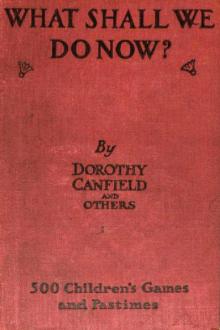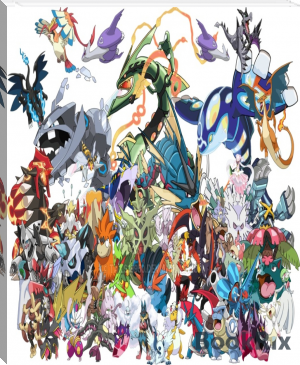What Shall We Do Now? by Dorothy Canfield Fisher (books on motivation .TXT) 📖

- Author: Dorothy Canfield Fisher
- Performer: -
Book online «What Shall We Do Now? by Dorothy Canfield Fisher (books on motivation .TXT) 📖». Author Dorothy Canfield Fisher
We'll gather Phyllis for nuts in May, on a cold and frosty morning.
The other row then ask—
Pray, who will you send to fetch her away, on a cold and frosty morning?
The answer perhaps is—
We're sending Arthur to fetch her away, on a cold and frosty morning.
Arthur then steps up to the line on one side and Phyllis on the other, and each tries to pull the other over it. The one that loses has to join the other row, and the singing begins again.
Old SoldierAll the players, except one, stand in a line. The other, who is the old soldier, then totters up to the end player, saying—
Pray, what have you got to give him to-day?
The player must then say what she will give him, but in doing so must not use the words "yes," "no," "black," "white" or "scarlet." The old soldier's object is to try and coax one of these words out of her, and he may ask any question he likes in order to do so. A mistake usually means a forfeit.
My Lady's ClothesA color-barred game for girls is "My Lady's Clothes" or "Dressing the Lady." The players first decide on what colors shall be forbidden, perhaps blue, black, and pink. The first one then asks the next, "How shall my lady be dressed for the ball?" and the answer must contain no mention of these colors. This question goes round the ring, no article being allowed to be mentioned twice.
Here I BakeOne player stands in the middle. The others join hands and surround her, their aim being to prevent her from getting out of the ring. She then passes round the ring touching the hands, at the first hands saying "Here I bake," at the second "Here I brew," at the third "Here I make my wedding-cake," and at the next "And here I mean to break through." With these last words she makes a dash to carry out the threat. If she succeeds, the player whose hand gave way first takes her place in the middle. Otherwise she must persevere until the ring is broken.
The CobblerThe cobbler sits in the middle on a stool or hassock, and the others join hands and dance round him. "Now then, customers," says the cobbler, "let me try on your shoes," and at the same time—but without leaving his seat—makes a dash for some one's feet. The aim of the others is to avoid being caught. Whoever is caught becomes cobbler.
CushionThe name of this game dates from the period when stiff cylinder-shaped horsehair sofa-cushions were commoner than they are now. One of these is placed in the middle of the room and the players join hands and dance round it, the object of each one being to make one of his neighbors knock the cushion over and to avoid knocking it over himself. Whoever does knock it down leaves the ring, until at last there are only two striving with each other. A hearth-brush, if it can be persuaded to stand up, makes a good substitute for a cushion. It also makes the game more difficult, being so very sensitive to touch.
The Day's ShoppingThe players sit in a ring, and the game is begun by one saying to the next, "I've just come back from shopping." "Yes," is the reply, "and what have you bought?" The first speaker has then to name some article which, without leaving her seat, she can touch, such as a pair of boots, a necktie, a watch-chain, a bracelet. Having done so, the next player takes up the character of the shopper, and so on round the ring. No article must, however, be named twice, which means that when the game has gone on for a round or two the answers become very difficult to find.
Clap In, Clap OutHalf the players go out, and the others stay in and arrange the chairs in a line so that there is an empty one next to every person. Each then chooses which of the others he will have to occupy the adjoining chair, and when this is settled some one tells the outside party that they can begin. One of them then comes in and takes the chair for which he thinks it most likely that he has been chosen. If he is right, everybody claps and he stays there. But if wrong, everybody hisses and he has to go out again. Another player then comes in, and so on until all the chairs are filled.
NeighborsAn extension of this game is "Neighbors." In "Neighbors" half the company are blindfolded, and are seated with an empty chair on the right hand of each. At a given signal all the other players occupy these empty chairs, as mysteriously as they can, and straightway begin to sing, either all to a tune played on the piano or independently. The object of the blind players is to find out, entirely by the use of the ear, who it is that is seated on their right. Those that guess correctly are unbandaged, and their places are taken by the players whose names they guessed. The others continue blindfolded until they guess rightly. One guess only is allowed each time.
Oranges and Lemons, or London Bridge is Falling DownThis pleasant old game begins by two of the older or taller players—one being Oranges and the other Lemons— taking places opposite each other and joining their hands high, thus making an arch for the rest to pass under in a long line. The procession then starts, each one holding the one in front by the coat or dress. As the procession moves along, the two players forming the arch repeat or chant these lines:—
Say the bells of St. Clement's.
"You owe me five farthings,"
Say the bells of St. Martin's.
"When will you pay me?"
Say the bells of Old Bailey.
"When I grow rich,"
Say the bells of Shoreditch.
"When will that be?"
Say the bells of Stepney.
"I do not know,"
Says the great bell of Bow.
Here comes a candle to light you to bed,
And here comes a chopper to chop off the last man's head.
With these final words the arch-players lower their arms and catch the head of the last of the procession. In order that the arrival of the end of the procession and the end of the verses shall come together, the last line can be lengthened like this—
Another shorter verse which is often sung is,
London Bridge is falling down. My fair lady.
In this case the two players who make the arch with their arms can choose any eatables they like—"ice cream" and "oysters." The players who are caught are asked which they prefer and their places are back of the one representing their choice. The captured player is then asked in a whisper which he will be, oranges or lemons? and if he says oranges, is placed accordingly behind that one of his capturers who is to have the oranges on his side. The procession and the rhyme begin again, and so on until all are caught and are ranged on their respective sides. Then a handkerchief is placed on the floor between the captains of the oranges and the lemons, and both sides pull, as in the "Tug of War" (page 38), until one side is pulled over the handkerchief.
General PostThe players sit round the room in a large circle, and, after appointing a postmaster to write down their names and call out the changes, choose each a town. One player is then blindfolded and placed in the middle. The game begins when the postmaster calls out the first journey, thus, "The post is going from Putney to Hongkong." The player who has chosen Putney and the player who has chosen Hongkong must then change places without being caught by the blind man, or without letting him get into either of their chairs first. Otherwise the player who is caught, or who ought to be in that chair, becomes the blind man. Every now and then "General Post" is called, when all the players have to change seats at the same time; and this gives the blind man an excellent chance.
Spin the PlatterA tin plate, to serve as platter, is placed in the middle of the room. The players sit round it in a large circle, each choosing either a number by which to be known, or the name of a town. The game is begun by one player taking up the plate, spinning it, calling out a number or town belonging to another, and hurrying back to his place. The one called has to spring up and reach the plate before it falls, and, giving it a fresh spin, call some one else. So it goes on. On paper there seems to be little in it, but in actual play the game is good on account of the difficulty of quite realizing that it is one's own borrowed name that has been called.
Kitchen UtensilsThis is a variety of "Spin the platter." The players sit in a ring and choose each the name of some kitchen utensil or something used in cooking, such as meat-chopper or raisins. One player then goes in the middle with a bunched-up handkerchief, and this he throws at some one, at the same time trying to say the name of that some one's kitchen utensil three times before that some one can say it once. If, as very often happens, the player at whom the handkerchief is thrown is so completely bewildered as to have lost the power of speech or memory until it is too late, he must change places with the one in the middle.
Up JenkinsThe players sit on opposite sides of a table, or in two opposite rows of chairs with a cloth spread over their laps. A quarter or dime or other small object is then passed about among the hands of one of the sides under the table or cloth. At the word "Up Jenkins!" called by the other side all these hands tightly clenched must be at once placed in view on the table or the cloth. The first player on the other side then carefully scans the faces of his opponents to see if any one bears an expression which seems to betray his possession of the quarter, and, having made up his mind, reaches over and touches the hand in which he hopes the quarter is, saying, "Tip it." The hand is then opened. If the guess is right the guessing side take the quarter and hide it. If wrong, the same side hide it again, and the second player on the guessing side tries his luck at discovering its whereabouts. A score is decided on before the game begins, and the winning side is that which make the fewest number of wrong guesses.
Another way to play "Up Jenkins" is to have the players, equally divided, sit opposite each other at a table. A quarter is then passed along under the table by one





Comments (0)